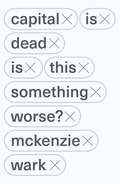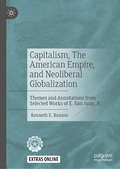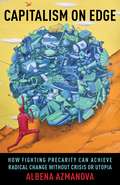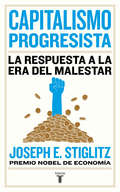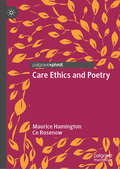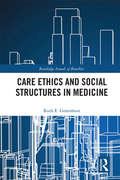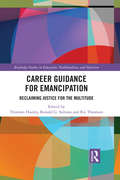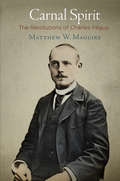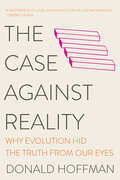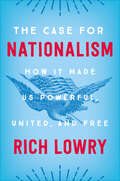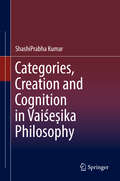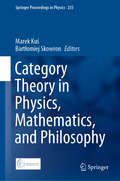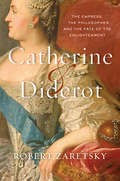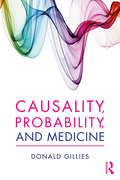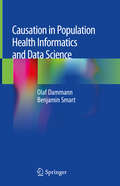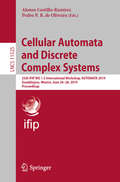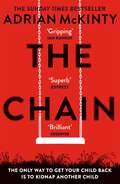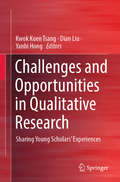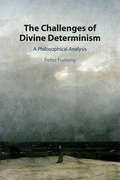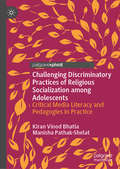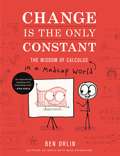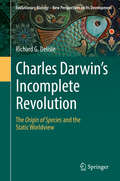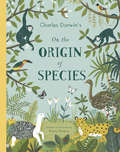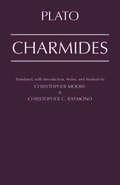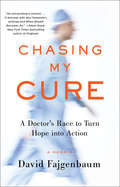- Table View
- List View
Capital is Dead: Is This Something Worse?
by McKenzie WarkIt's not capitalism, it's not neoliberalism - what if it's something worse?In this radical and visionary new book, McKenzie Wark argues that the all-pervasive presence of data in our networked society has given rise to a new mode of production, one not ruled over by capitalists and their factories but by those who own and control the flows of information. Yet, if this is not capitalism anymore, could it be something worse? What if the world we're living in is more dystopian than the techno utopias of the Silicon Valley imagination? And, if this is the case, how do we find a way out? Capital is Dead offers not only the theoretical tools to analyse this new world of information, but also to change it.A follow-up to her groundbreaking A Hacker Manifesto, Wark takes us on a tour of our information age. Drawing on the writings of the Situationists and a range of contemporary theorists, Capital is Dead offers a vast panorama of the contemporary condition and the classes that control it.
Capitalism, The American Empire, and Neoliberal Globalization: Themes and Annotations from Selected Works of E. San Juan, Jr.
by Kenneth E. BauzonThis book looks at facets in the history of capitalism from the Enlightenment period, through the emergence of the American Empire in the Pacific, and to the contemporary era of neoliberal globalization. This re-telling of history is done by drawing from the works of E. San Juan, Jr. (henceforth, San Juan), considered arguably one of the great contemporary cultural and literary critics of our time. In this author's view, San Juan's lifetime of works offer a living documentation of, among others, the history and thought of the modern world highlighted by the rise of capitalism through the contemporary era of neoliberal globalization, and shepherded to its hegemonic status by what stands today as the preeminent empire of the United States. The book underscores the symbiosis between contemporary capitalism as an economic system based on accumulation on the one hand, and the American imperial state on the other, just as it revisits the colonial project that was carried out in capitalism's wake, the violence and subjugation inflicted on its victims, and how this colonial project has morphed into a new form of colonialism (or neocolonialism) maintained and enforced through the rules and institutional mechanisms of what is popularly known as neoliberal globalization that also provides the ideological and legal rationale for the commodification and the ultimate grab of the global commons reminiscent of the classical, albeit cruder, form of colonialism.
Capitalism on Edge: How Fighting Precarity Can Achieve Radical Change Without Crisis or Utopia (New Directions in Critical Theory #69)
by Albena AzmanovaThe wake of the financial crisis has inspired hopes for dramatic change and stirred visions of capitalism’s terminal collapse. Yet capitalism is not on its deathbed, utopia is not in our future, and revolution is not in the cards. In Capitalism on Edge, Albena Azmanova demonstrates that radical progressive change is still attainable, but it must come from an unexpected direction.Azmanova’s new critique of capitalism focuses on the competitive pursuit of profit rather than on forms of ownership and patterns of wealth distribution. She contends that neoliberal capitalism has mutated into a new form—precarity capitalism—marked by the emergence of a precarious multitude. Widespread economic insecurity ails the 99 percent across differences in income, education, and professional occupation; it is the underlying cause of such diverse hardships as work-related stress and chronic unemployment. In response, Azmanova calls for forging a broad alliance of strange bedfellows whose discontent would challenge not only capitalism’s unfair outcomes but also the drive for profit at its core. To achieve this synthesis, progressive forces need to go beyond the old ideological certitudes of, on the left, fighting inequality and, on the right, increasing competition. Azmanova details reforms that would enable a dramatic transformation of the current system without a revolutionary break. An iconoclastic critique of left orthodoxy, Capitalism on Edge confronts the intellectual and political impasses of our time to discern a new path of emancipation.
Capitalismo progresista: La respuesta a la era del malestar
by Joseph E. StiglitzUn brillante y provocador manifiesto para salvar al capitalismo de sí mismo. Todos tenemos la sensación de que el sistema económico se inclina a favor de las grandes empresas. Unas pocas corporaciones dominan sectores enteros; la industria financiera regula la economía a su antojo; los gobiernos negocian acuerdos comerciales que en absoluto benefician a los intereses de los ciudadanos; y las tecnológicas custodian celosamente una ingente cantidad de datos personales sin supervisión y trafican con ellos. Las nuevas tecnologías, lejos de ayudar, tienden a empeorar las cosas, contribuyendo a disparar la desigualdad, ralentizar el crecimiento y fomentar el desempleo. Pese a todo, Joseph Stiglitz, premio Nobel de Economía, insiste en que, aunque no nos lo parezca, tenemos el poder de reconstruir los cimientos del capitalismo. En este oportuno libro, identifica las verdaderas fuentes de la prosperidad económica compartida, basadas en la investigación, la educación y el imperio de la ley. Consciente de los peligros del fundamentalismo de mercado, y de la amenaza al poder judicial, las universidades y los medios de comunicación, instituciones que durante mucho tiempo han sido la base de la prosperidad y la democracia, nos descubre cómo hemos llegado a esta situación y marca el camino para combatir algunos de los mayores desafíos de nuestro tiempo. La crítica ha dicho...«Una defensa autorizada de la intervención del gobierno utilizando la economía convencional y una explicación de cómo construir una sociedad más justa sin sacrificar el crecimiento.»Gavin Jacobson, Financial Times «Sus recetas radicales.»Gerard Baker, The Times «Capitalismo progresista aporta ideas y ambiciones a los trabajos previos de Stiglitz.»Daniel W. Drezner, The New York Times «Urgente. Si no abordamos el aumento de la desigualdad causada por la globalización mal administrada y la liberalización financiera, el discurso demagógico encontrará una audiencia receptiva.»The New Yorker «Stiglitz es un economista increíblemente brillante.»Paul Krugman «Junto con Krugman y Piketty, Stiglitz forma el triunvirato de los principales críticos económicos del capitalismo global.»Andrew Anthony, The Guardian
Care Ethics and Poetry
by Maurice Hamington Ce RosenowCare Ethics and Poetry is the first book to address the relationship between poetry and feminist care ethics. The authors argue that morality, and more specifically, moral progress, is a product of inquiry, imagination, and confronting new experiences. Engaging poetry, therefore, can contribute to the habits necessary for a robust moral life—specifically, caring. Each chapter offers poems that can provoke considerations of moral relations without explicitly moralizing. The book contributes to valorizing poetry and aesthetic experience as much as it does to reassessing how we think about care ethics.
Care Ethics and Social Structures in Medicine (Routledge Annals of Bioethics)
by Ruth E. GroenhoutThis book examines the central structures in medicine—medical knowledge, economics, technological innovation, and medical authority—from the perspective of an ethics of care. The author analyzes each of these structures in detail before considering the challenges they present to end of life care. The perspective of an ethics of care allows for a careful focus on how these structures affect the capacity of the health care system to provide the care patients need, on the impact they have on the relationships between patients and care-givers, and on how they affect the care-givers in terms of their own sense of identity and capacity for care. This book offers one of the first focused discussions of an ethics of care across a wide range of social issues and structures in contemporary medicine. It will be of keen interest to advanced students and scholars in bioethics and health care ethics who are interested in these important issues.
Career Guidance for Emancipation: Reclaiming Justice for the Multitude (Routledge Studies in Education, Neoliberalism, and Marxism #18)
by Tristram Hooley Ronald G. Sultana Rie ThomsenThis edited collection explores ways in which social justice can be integrated into career guidance practice. Chapter authors propose models and practices which can contribute to struggles for social justice and consider how career guidance can play a role in these struggles. They explore policy and practice in the light of critical social theory both critiquing career guidance and opening up new possibilities for the field. The volume moves the discipline away from its overwhelming reliance on psychology in favor of theoretically pluralistic approaches informed by critical thinking in a range of disciplines. It seeks to expand the possibilities that are available to career guidance practitioners and researchers to support the growth of human flourishing and solidarity.
Carnal Spirit: The Revolutions of Charles Peguy
by Matthew W. MaguireIt is rare for a thinker of Charles Péguy's considerable stature and influence to be so neglected in Anglophone scholarship. The neglect may be in part because so much about Péguy is contestable and paradoxical. He strongly opposed the modern historicist drive to reduce writers to their times, yet he was very much a product of philosophical currents swirling through French intellectual life at the turn of the twentieth century. He was a passionate Dreyfusard who converted to Catholicism but was a consistent anticlerical. He was a socialist and an anti-Marxist, and at once a poet, journalist, and philosopher.Péguy (1873-1914) rose from a modest childhood in provincial France to a position of remarkable prominence in European intellectual life. Before his death in battle in World War I, he founded his own journal in order to publish what he thought most honestly, and urgently, needed to be said about politics, history, philosophy, literature, art, and religion. His writing and life were animated by such questions as: Is it possible to affirm universal human rights and individual freedom and find meaning in a national identity? How should different philosophies and religions relate to one another? What does it mean to be modern?A voice like Péguy's, according to Matthew Maguire, reveals the power of the individual to work creatively with the diverse possibilities of a given historical moment. Carnal Spirit expertly delineates the historical origins of Péguy's thinking, its unique trajectory, and its unusual position in his own time, and shows the ways in which Péguy anticipated the divisions that continue to trouble us.
The Case Against Reality: Why Evolution Hid The Truth From Our Eyes
by Donald HoffmanCan we trust our senses to tell us the truth? Challenging leading scientific theories that claim that our senses report back objective reality, cognitive scientist Donald Hoffman argues that while we should take our perceptions seriously, we should not take them literally. How can it be possible that the world we see is not objective reality? And how can our senses be useful if they are not communicating the truth? Hoffman grapples with these questions and more over the course of this eye-opening work. Ever since Homo sapiens has walked the earth, natural selection has favored perception that hides the truth and guides us toward useful action, shaping our senses to keep us alive and reproducing. We observe a speeding car and do not walk in front of it; we see mold growing on bread and do not eat it. These impressions, though, are not objective reality. Just like a file icon on a desktop screen is a useful symbol rather than a genuine representation of what a computer file looks like, the objects we see every day are merely icons, allowing us to navigate the world safely and with ease. The real-world implications for this discovery are huge. From examining why fashion designers create clothes that give the illusion of a more “attractive” body shape to studying how companies use color to elicit specific emotions in consumers, and even dismantling the very notion that spacetime is objective reality, The Case Against Reality dares us to question everything we thought we knew about the world we see.
The Case for Nationalism: How It Made Us Powerful, United, and Free
by Rich Lowry“Rich Lowry not only makes an original and compelling case for nationalism but also carefully demonstrates how throughout Western history and literature, enlightened nationhood was the glue that held diverse democratic societies together in peace and kept them safe in war. A fascinating, erudite—and much-needed—defense of a hallowed idea unfairly under current attack.” — Victor Davis Hanson“America is an idea, but it’s not only an idea: America is also a nation with flesh-and-blood people, particular lands with real borders, and its own history and culture. Rich Lowry’s learned and brisk The Case for Nationalism defends these unfashionable truths against transnational assault from both the left and the right while reminding us that nationalist sentiments are essential to self-government.” — Tom Cotton“Rich Lowry’s The Case for Nationalism is a massively important exploration of what nationalism really means, how it has been radically misinterpreted, and why American nationalism, properly construed, is essential to the project of restoring unity and purpose in our country.” — Ben Shapiro“Anyone who loves freedom knows that nothing today is more tragically misunderstood than the vital subject of this important book. I thank God that someone of the caliber of my friend Rich Lowry has taken it on as he so brilliantly has!” — Eric Metaxas
Categories, Creation and Cognition in Vaiśeṣika Philosophy
by ShashiPrabha KumarThe proposed book presents an overview of select theories in the classical Vaiśeṣika system of Indian philosophy, such as the concept of categories, creation and existence, atomic theory, consciousness and cognition. It also expounds in detail the concept of dharma, the idea of the highest good and expert testimony as a valid means of knowing in Vaiśeṣika thought. Some of the major themes discussed are the religious inclination of Vaiśeṣika thought towards Pasupata Saivism, the affiliation of the Vaiśeṣika System to the basic foundations of Indian philosophical thought, namely Veda and Yoga, and their insights into science, hermeneutics and metaphysics. In addition, this book includes recent Sanskrit commentaries on key Vaiśeṣika texts and provides a glimpse of Vaiśeṣika studies across the world. Overall, this book enunciates the Vaiśeṣika view from original sources and is an important work for Vaiśeṣika studies in current times for serious students as well as researchers.
Category Theory in Physics, Mathematics, and Philosophy (Springer Proceedings in Physics #235)
by Marek Kuś Bartłomiej SkowronThe contributions gathered here demonstrate how categorical ontology can provide a basis for linking three important basic sciences: mathematics, physics, and philosophy. Category theory is a new formal ontology that shifts the main focus from objects to processes.The book approaches formal ontology in the original sense put forward by the philosopher Edmund Husserl, namely as a science that deals with entities that can be exemplified in all spheres and domains of reality. It is a dynamic, processual, and non-substantial ontology in which all entities can be treated as transformations, and in which objects are merely the sources and aims of these transformations.Thus, in a rather surprising way, when employed as a formal ontology, category theory can unite seemingly disparate disciplines in contemporary science and the humanities, such as physics, mathematics and philosophy, but also computer and complex systems science.
Catherine & Diderot: The Empress, the Philosopher, and the Fate of the Enlightenment
by Robert ZaretskyIn a dual biography crafted around the famous encounter between the French philosopher who wrote about power and the Russian empress who wielded it with great aplomb, Robert Zaretsky invites us to reflect on the fraught relationship between politics and philosophy, and between a man of thought and a woman of action.
Causality, Probability, and Medicine
by Donald GilliesWhy is understanding causation so important in philosophy and the sciences? Should causation be defined in terms of probability? Whilst causation plays a major role in theories and concepts of medicine, little attempt has been made to connect causation and probability with medicine itself. Causality, Probability, and Medicine is one of the first books to apply philosophical reasoning about causality to important topics and debates in medicine. Donald Gillies provides a thorough introduction to and assessment of competing theories of causality in philosophy, including action-related theories, causality and mechanisms, and causality and probability. Throughout the book he applies them to important discoveries and theories within medicine, such as germ theory; tuberculosis and cholera; smoking and heart disease; the first ever randomized controlled trial designed to test the treatment of tuberculosis; the growing area of philosophy of evidence-based medicine; and philosophy of epidemiology. This book will be of great interest to students and researchers in philosophy of science and philosophy of medicine, as well as those working in medicine, nursing and related health disciplines where a working knowledge of causality and probability is required.
Causation in Population Health Informatics and Data Science
by Olaf Dammann Benjamin SmartMarketing text: This book covers the overlap between informatics, computer science, philosophy of causation, and causal inference in epidemiology and population health research. Key concepts covered include how data are generated and interpreted, and how and why concepts in health informatics and the philosophy of science should be integrated in a systems-thinking approach. Furthermore, a formal epistemology for the health sciences and public health is suggested. Causation in Population Health Informatics and Data Science provides a detailed guide of the latest thinking on causal inference in population health informatics. It is therefore a critical resource for all informaticians and epidemiologists interested in the potential benefits of utilising a systems-based approach to causal inference in health informatics.
Cellular Automata and Discrete Complex Systems: 25th IFIP WG 1.5 International Workshop, AUTOMATA 2019, Guadalajara, Mexico, June 26–28, 2019, Proceedings (Lecture Notes in Computer Science #11525)
by Alonso Castillo-Ramirez Pedro P. B. de OliveiraThis volume constitutes the refereed proceedings of the 25th IFIP WG 1.5 International Workshop on Cellular Automata and Discrete Complex Systems, AUTOMATA 2019, held in Guadalajara, Mexico, in June 2019.The 7 regular papers presented in this book were carefully reviewed and selected from a total of 10 submissions. The topics of the conference include deal with dynamical, topological, ergodic and algebraic aspects of CA and DCS, algorithmic and complexity issues, emergent properties, formal languages, symbolic dynamics, tilings, models of parallelism and distributed systems, timing schemes, synchronous versus asynchronous models, phenomenological descriptions, scientic modeling, and practical applications.
The Chain: The Award-Winning Suspense Thriller of the Year
by Adrian McKintyTHE ONLY WAY TO GET YOUR CHILD BACK IS TO KIDNAP ANOTHER CHILD'A blazing, full-tilt thriller that entirely justifies the hype' GUARDIAN'A heart-stopping roller coaster' DAILY MAIL* * * * *YOUR PHONE RINGS.A STRANGER HAS KIDNAPPED YOUR CHILD.TO FREE THEM YOU MUST ABDUCT SOMEONE ELSE'S CHILD.YOUR CHILD WILL BE RELEASED WHEN YOUR VICTIM'S PARENTS KIDNAP ANOTHER CHILD.IF ANY OF THESE THINGS DON'T HAPPEN:YOUR CHILD WILL BE KILLED.VICTIM. SURVIVOR. ABDUCTOR. CRIMINAL.YOU WILL BECOME EACH ONE. YOU ARE NOW PART OF THE CHAIN * * * * *THE MULTI-AWARD-WINNING THRILLERWinner: Theakstons Old Peculier Crime Novel of the YearWinner: Ned Kelly Award for Best International Crime Fiction Winner: International Thriller Writers Awards - Best Hardcover Winner: Macavity Awards - Best International Crime Fiction Winner: Barry Award - Thriller of the Year*****'A heart-stopping roller coaster'DAILY MAIL'The book everyone is talking about'MIRROR'Scary, plausible, gripping.'IAN RANKIN'You'll miss meals, sleep, and your stop on the bus - guaranteed.'VAL McDERMID'I writhed with the pain of withdrawal when I finished it. Deserves to be the popular hit of the year.'DAILY TELEGRAPH'Incredibly propulsive and original. You won't shake it for a long time.'STEPHEN KING'A masterpiece. You will never be able to forget it.'DON WINSLOW'A unique and unforgettable thriller. Breath-taking, breakneck, brilliant.'MARK BILLINGHAM'Striking, memorable, should be savoured.'TANA FRENCH'Explosively brilliant. Genuinely unputdownable. Terribly plausible'OBSERVER'I may not read a better thriller in my lifetime.'STEVE CAVANAGH 'An electrifying thriller - one of the very best of its kind'FIONA CUMMINS'What a fantastic idea and perfectly written. I'm quite jealous.'ANTHONY HOROWITZ'Terrifying. Terrific.'MICK HERRON'THE CHAIN does for parenting what Gone Girl did for marriage. A must-read thriller.'JAMES SWALLOW'Diabolical, unnerving, relentless.'DENNIS LEHANE'Utterly brilliant'ELLY GRIFFITHSA 'THRILLER OF THE YEAR' SELECTION FOR:GUARDIANDAILY TELEGRAPHAMAZONEXPRESSOBSERVERTIME MAGAZINE
Challenges and Opportunities in Qualitative Research: Sharing Young Scholars’ Experiences
by Kwok Kuen Tsang Dian Liu Yanbi HongThis book shares young scholars’ (current PhD students and those who completed their PhD between 2010 and 2015) experiences with conducting qualitative social research. Intended as a guide for newcomers to the field, it focuses on the practical issues encountered by qualitative researchers rather than methodological discussions. Accordingly, it addresses a range of representative issues in the qualitative research process – namely research design, data access, data collection, and data analysis – and covers a variety of social sciences topics.
The Challenges of Divine Determinism: A Philosophical Analysis
by Peter FurlongIn this volume, Peter Furlong delves into the question of divine determinism - the view that God has determined everything that has ever happened or will ever happen. This view, which has a long history among multiple religious and philosophical traditions, faces a host of counterarguments. It seems to rob humans of their free will, absolving them of all the wrongs they commit. It seems to make God the author of sin and thus blameworthy for all human wrongdoing. Additionally, it seems to undermine the popular 'Free Will Defense' of the problem of evil, to make a mockery of the claim that God loves us, and to make it inappropriate for God to blame and punish us. This work carefully formulates these and other objections to divine determinism and investigates possible responses to each of them, providing systematic and balanced discussion of this major philosophical and theological debate.
Challenging Discriminatory Practices of Religious Socialization among Adolescents: Critical Media Literacy and Pedagogies in Practice
by Kiran Vinod Bhatia Manisha Pathak-ShelatThis book examines how religion operates as an institution of governance and discipline in society. The authors unravel the ways in which adolescents are socialized into adhering to the dictates of their religious identities, which often translates into practices of micro-aggression enacted in and through their interaction with the ‘religious other’ in schools and classrooms. Through ethnographic immersion in villages in the Gujarat, the authors identify media as a powerful source through which the dominant ideology of religious discrimination is perpetuated among adolescents. Subsequently, a critical media education framework was developed in order to equip these young people with the critical skills needed to challenge power relations, with the goal being to identify resources for resistance within themselves and their immediate media environments. Using pedagogic techniques such as spatial and cultural mapping, content creation and applied theatre practices to create a reflective yet practical guide, the findings of this book can be applied to a wide range of socio-cultural contexts.
Change Is the Only Constant: The Wisdom of Calculus in a Madcap World
by Ben OrlinThe next book from Ben Orlin, the popular math blogger and author of the underground bestseller Math With Bad Drawings. Change Is The Only Constant is an engaging and eloquent exploration of the intersection between calculus and daily life, complete with Orlin's sly humor and wonderfully bad drawings. Change is the Only Constant is an engaging and eloquent exploration of the intersection between calculus and daily life, complete with Orlin's sly humor and memorably bad drawings. By spinning 28 engaging mathematical tales, Orlin shows us that calculus is simply another language to express the very things we humans grapple with every day -- love, risk, time, and most importantly, change. Divided into two parts, "Moments" and "Eternities," and drawing on everyone from Sherlock Holmes to Mark Twain to David Foster Wallace, Change is the Only Constant unearths connections between calculus, art, literature, and a beloved dog named Elvis. This is not just math for math's sake; it's math for the sake of becoming a wiser and more thoughtful human.
Charles Darwin's Incomplete Revolution: The Origin of Species and the Static Worldview (Evolutionary Biology – New Perspectives on Its Development #1)
by Richard G. DelisleThis book offers a thorough reanalysis of Charles Darwin's Origin of Species, which for many people represents the work that alone gave rise to evolutionism. Of course, scholars today know better than that. Yet, few resist the temptation of turning to the Origin in order to support it or reject it in light of their own work. Apparently, Darwin fills the mythical role of a founding figure that must either be invoked or repudiated. The book is an invitation to move beyond what is currently expected of Darwin's magnum opus. Once the rhetorical varnish of Darwin's discourses is removed, one discovers a work of remarkably indecisive conclusions. The book comprises two main theses: (1) The Origin of Species never remotely achieved the theoretical unity to which it is often credited. Rather, Darwin was overwhelmed by a host of phenomena that could not fit into his narrow conceptual framework. (2) In the Origin of Species, Darwin failed at completing the full conversion to evolutionism. Carrying many ill-designed intellectual tools of the 17th and 18th centuries, Darwin merely promoted a special brand of evolutionism, one that prevented him from taking the decisive steps toward an open and modern evolutionism. It makes an interesting read for biologists, historians and philosophers alike.
Charles Darwin's On the Origin of Species
by Sabina RadevaA picture book adaptation of Charles Darwin's groundbreaking On the Origin of Species, lushly illustrated and told in accessible and engaging easy-to-understand text for young readers.On the Origin of Species revolutionized our understanding of the natural world. Now young readers can discover Charles Darwin's groundbreaking theory of evolution for themselves in this stunning picture-book adaptation that uses stylish illustrations and simple text to introduce how species form, develop, and change over time.
Charmides
by Plato"Moore and Raymond's Charmides is very impressive. The translation is excellent, and the Introduction and notes guide the reader into thorny problems in a way that renders them understandable: e.g., how to translate sôphrosunê, why we should care about self-knowledge, or how to seek to clarify important ethico-political concepts. The result provides almost all of what an instructor will need to introduce this unjustly neglected dialogue into a syllabus. Moreover, the volume is a wide-ranging resource for specialists. Students of the 'Socratic Dialogues' will profit greatly from this admirable contribution." —David J. Murphy is co-editor of Antiphontis et Andocidis Orationes (Oxford) and author of "The Basis of the Text of Plato's Charmides" (Mnemosyne) and many other contributions on the Charmides. He lives in New York City.
Chasing My Cure: A Doctor's Race to Turn Hope into Action; A Memoir
by David FajgenbaumThe powerful memoir of a young doctor and former college athlete diagnosed with a rare disease who spearheaded the search for a cure—and became a champion for a new approach to medical research.“An extraordinary memoir . . . It belongs with Atul Gawande’s writings and When Breath Becomes Air.”—Adam Grant, New York Times bestselling author of OriginalsDavid Fajgenbaum was a former Georgetown quarterback nicknamed the Beast in medical school, where he was also known for his unmatched mental stamina. But things changed dramatically when he began suffering from inexplicable fatigue. In a matter of weeks, his organs were failing and he was read his last rites. Doctors were baffled by his condition, which they had yet to even diagnose. Floating in and out of consciousness, Fajgenbaum prayed for the equivalent of a game day overtime: a second chance. Miraculously, Fajgenbaum survived—only to endure repeated near-death relapses from what would eventually be identified as a form of Castleman disease, an extremely deadly and rare condition that acts like a cross between cancer and an autoimmune disorder. When he relapsed while on the only drug in development and realized that the medical community was unlikely to make progress in time to save his life, Fajgenbaum turned his desperate hope for a cure into concrete action: Between hospitalizations he studied his own charts and tested his own blood samples, looking for clues that could unlock a new treatment. With the help of family, friends, and mentors, he also reached out to other Castleman disease patients and physicians, and eventually came up with an ambitious plan to crowdsource the most promising research questions and recruit world-class researchers to tackle them. Instead of waiting for the scientific stars to align, he would attempt to align them himself. More than five years later and now married to his college sweetheart, Fajgenbaum has seen his hard work pay off: A treatment that he identified has induced a tentative remission and his novel approach to collaborative scientific inquiry has become a blueprint for advancing rare disease research. His incredible story demonstrates the potency of hope, and what can happen when the forces of determination, love, family, faith, and serendipity collide.“A page-turning chronicle of living, nearly dying, and discovering what it really means to be invincible in hope.”—Angela Duckworth, #1 New York Times bestselling author of Grit
